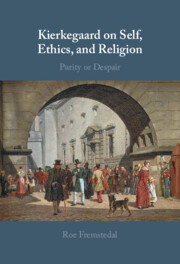Book contents
- Kierkegaard on Self, Ethics, and Religion
- Kierkegaard on Self, Ethics, and Religion
- Copyright page
- Dedication
- Contents
- Figures and Tables
- Acknowledgments
- Abbreviations
- Introduction
- Part I Self, Despair, and Wholeheartedness
- Part II Morality, Prudence, and Religion
- Chapter 4 The Critique of Eudaimonism: Virtue Ethics, Kantianism, and Beyond
- Chapter 5 Noneudaimonistic Ethics and Religion: Happiness and Salvation
- Chapter 6 The “Teleological Suspension of the Ethical” and Abraham’s Sacrifice of Isaac
- Chapter 7 Moralized Religion: The Identity of the Good and the Divine
- Part III “Subjectivity, Inwardness, Is Truth”
- Part IV Faith and Reason
- References
- Index
Chapter 6 - The “Teleological Suspension of the Ethical” and Abraham’s Sacrifice of Isaac
from Part II - Morality, Prudence, and Religion
Published online by Cambridge University Press: 27 January 2022
- Kierkegaard on Self, Ethics, and Religion
- Kierkegaard on Self, Ethics, and Religion
- Copyright page
- Dedication
- Contents
- Figures and Tables
- Acknowledgments
- Abbreviations
- Introduction
- Part I Self, Despair, and Wholeheartedness
- Part II Morality, Prudence, and Religion
- Chapter 4 The Critique of Eudaimonism: Virtue Ethics, Kantianism, and Beyond
- Chapter 5 Noneudaimonistic Ethics and Religion: Happiness and Salvation
- Chapter 6 The “Teleological Suspension of the Ethical” and Abraham’s Sacrifice of Isaac
- Chapter 7 Moralized Religion: The Identity of the Good and the Divine
- Part III “Subjectivity, Inwardness, Is Truth”
- Part IV Faith and Reason
- References
- Index
Summary
Chapter 6 argues that it is Kierkegaard, rather than Kant, who denies that religion is anything beyond or above ethics. It thus criticizes the widespread view that Kierkegaard reacted against Kant’s (alleged) reduction of religion to ethics by introducing the “teleological suspension of the ethical.” First, Kierkegaard rules out secular ethics by identifying the good and the divine. Second, he moralizes religion by interpreting natural religion in terms of non-Christian ethics and Christianity in terms of Christian ethics. For Kierkegaard, the first two are necessary yet insufficient, so that Christian ethics may only partially replace non-Christian ethics. As a result, there is no suspension of ethics in general, only a suspension of one variant of it by another variant. Even in the case of Abraham’s sacrifice of Isaac, Kierkegaard’s position is far more defensible than normally assumed, since he maintains that it would have been “an error on [Abraham’s] part,” if he were to murder Isaac (SKS 24, 375, NB24:89 / KJN 8, 379). Finally, he denies that anyone could possibly imitate Abraham’s sacrifice by killing someone.
Keywords
- Type
- Chapter
- Information
- Kierkegaard on Self, Ethics, and ReligionPurity or Despair, pp. 105 - 120Publisher: Cambridge University PressPrint publication year: 2022

